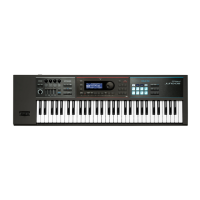52
MFX/Chorus/Reverb Parameters
50: REVERSE DELAY
This is a reverse delay that adds a reversed and delayed sound to the input sound. A
tap delay is connected immediately after the reverse delay.
Feedback
Rev. Delay
L out
2-Band
EQ
Rev
Delay
D2
D1
D3
Parameter Value Explanation
Threshold 0–127
Volume at which the reverse delay will begin to
be applied
Rev Delay Time 0–1300[msec], note
Delay time from when sound is input into the
reverse delay until the delay sound is heard
Rev Delay
Feedback #
-98–+98[%]
Proportion of the delay sound that is to be
returned to the input of the reverse delay
(negative (-) values invert the phase)
Rev Delay HF Damp
200–8000[Hz],
BYPASS
Frequency at which the high-frequency content
of the reverse-delayed sound will be cut (BYPASS:
no cut)
Rev Delay Pan L64–63R Panning of the reverse delay sound
Rev Delay Level 0–127 Volume of the reverse delay sound
Delay 1–3 Time 0–1300[msec], note
Delay time from when sound is input into the tap
delay until the delay sound is heard
Delay 3 Feedback # -98–+98[%]
Proportion of the delay sound that is to be
returned to the input of the tap delay (negative (-)
values invert the phase)
Delay HF Damp
200–8000[Hz],
BYPASS
Frequency at which the hi-frequency content of
the tap delay sound will be cut (BYPASS: no cut)
Delay 1 Pan,
Delay 2 Pan
L64–63R Panning of the tap delay sounds
Delay 1 Level,
Delay 2 Level
0–127 Volume of the tap delay sounds
Low Gain -15–+15[dB] Gain of the low range
High Gain -15–+15[dB] Gain of the high range
Balance # D100:0W–D0:100W
Volume balance of the original sound
(D) and delay sound (W)
Level 0–127 Output level
51: SHUFFLE DELAY
Adds a shue to the delay sound, giving the sound a bouncy delay eect with a
swing feel.
Feedback
Delay
L out
2-Band
EQ
A
B
Delay A
Delay B
Parameter Value Explanation
Delay Time # 0–2600[msec], note Adjusts the time until the delay sound is heard.
Shue Rate # 0–100
Adjusts the ratio (as a percentage) of the time that
elapses before Delay B sounds relative to the time
that elapses before the Delay A sounds.
When set to 100, the delay times are the same.
Acceleration 0–15
Adjusts the speed which the Delay Time changes
from the current setting to its specied new
setting.
Feedback # -98–+98[%]
Adjusts the amount of the delay that’s feedback
into the eect. Negative (-) settings invert the
phase.
HF Damp
200–8000[Hz],
BYPASS
Adjusts the frequency above which sound fed
back to the eect is ltered out. If you don’t
want to lter out any high frequencies, set this
parameter to BYPASS.
Pan A, B L64–63R Stereo location of Delay A/B
Level A, B 0–127 Volume of delay A/B
Low Gain -15–+15[dB] Gain of the low range
High Gain -15–+15[dB] Gain of the high range
Balance # D100:0W–D0:100W
Volume balance between the direct sound (D)
and the eect sound (W)
Level 0–127 Output level
52: 3D DELAY
This applies a 3D eect to the delay sound. The delay sound will be positioned 90
degrees left and 90 degrees right.
3D Delay L
3D Delay R
3D Delay C
Level
Feedback
EQ
2-Band
L out
Parameter Value Explanation
Delay Left
0–2600[msec], note
Adjusts the delay time from the direct sound until
the delay sound is heard.
Delay Right
Delay Center
Center Feedback # -98–+98[%]
Adjusts the proportion of the delay sound that is
fed back into the eect.
Negative (-) settings will invert the phase.
HF Damp
200–8000[Hz],
BYPASS
Adjusts the frequency above which sound fed
back to the eect will be cut. If you do not want
to cut the high frequencies, set this parameter to
BYPASS.
Left Level
0–127 Output level of the delay soundRight Level
Center Level
Output Mode
The optimal 3D eect will be achieved.
SPEAKER When using speakers
PHONES When using headphones
Low Gain -15–+15[dB] Gain of the low range
High Gain -15–+15[dB] Gain of the high range
Balance # D100:0W–D0:100W
Volume balance between the direct sound (D)
and the eect sound (W)
Level 0–127 Output level
53: ANALOG DELAY
A stereo delay in which the delay time can be varied smoothly.
L out
Feedback
Feedback
Pan L
Pan R
Time Ctrl Delay
Time Ctrl Delay
2-Band EQ
2-Band EQ
Parameter Value Explanation
Delay Time # 0–1300[msec], note Adjusts the time until the delay is heard.
Acceleration 0–15
Adjusts the speed which the Delay Time changes
from the current setting to a specied new
setting. The rate of change for the Delay Time
directly aects the rate of pitch change.
Feedback # -98–+98[%]
Adjusts the amount of the delay that’s fed back
into the eect. Negative (-)settings invert the
phase.
HF Damp
200–8000[Hz],
BYPASS
Adjusts the frequency above which sound fed
back to the eect is ltered out. If you do not
want to lter out any high frequencies, set this
parameter to BYPASS.
Low Gain -15–+15[dB] Gain of the low range
High Gain -15–+15[dB] Gain of the high range
Balance # D100:0W–D0:100W
Volume balance between the direct sound (D)
and the delay sound (W)
Level 0–127 Output level
3
3
3
3

